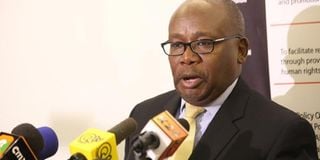Attorney-General Muigai suspends registration of new religious organisations

Attorney-General Githu Muigai. The AG has been accused of being a stumbling block to retired teachers getting their pensions amounting to Sh16.7 billion. PHOTO | BILLY MUTAI |
What you need to know:
- Attorney-General Prof Githu Muigai has also directed existing religious organisations to file details of their current status and financial returns with the Registrar of Societies.
- He said the move to regulate religious organisations has been necessitated by recent media reports on the alleged illicit activities of certain religious institutions.
- Director of Public Prosecutions Keriako Tobiko on Thursday last week ordered an investigation of the activities of the preacher.
The government has now suspended the registration of new religious organisations indefinitely as it moves to streamline the regulation of such entities.
The suspension takes effect on Tuesday, November 11.
In a statement, Attorney-General Prof Githu Muigai also directed existing religious organisations to file details of their current status and financial returns with the Registrar of Societies.
That information, the AG noted, must include the full name of the organisation, a registration number, the date of registration and the full particulars of office bearers, copies of identification cards, passport-size photos and a copy of the Kenya Revenue Authority’s personal identification number (PIN).
“The State Law Office has also invited various religious organisations, (the) parliamentary Committee on Justice and Legal Affairs and the Commission on the Implementation of the Constitution for a meeting to be held on Friday, November 14, to discuss proposed regulations on religious organisations operating in Kenya,” said the AG.
RESTORE PUBLIC CONFIDENCE
He said the move to regulate religious organisations was prompted by recent media reports on the alleged illicit activities of certain religious institutions and the need for remedial actions in order to restore public confidence.
Among those invited to the Friday meeting are Dr Francis Kuria of the Inter-Religious Council of Kenya; Fr Vincent Wambugu of the Kenya Episcopal Conference (KEC); and Rev Peter Karanja Mwangi, the general-secretary of the National Council of Churches of Kenya (NCCK).
Others are Vanraj Sarvaiya of the Hindu Council of Kenya (HCK) and Prof Abdul Gafar Al-Busaidy of the Supreme Council of Kenya Muslims (Supkem).
Last Sunday, the government said it was working on a model for registering religious organisation following an exposé on preacher Victor Kanyari that was broadcast on TV channel KTN.
A statement from State House said that Prof Muigai had already proposed to the government “a framework for registration and management of religious communities.”
According to the proposal, only churches, mosques and temples that reflect transparency, accountability and spirituality will be registered.
The investigative series had last week exposed malpractices by Mr Kanyari’s Salvation Healing Ministry church that included coached testimonies, fake healings and outright extortions.
ORDERED INVESTIGATIONS
Director of Public Prosecutions Keriako Tobiko on Thursday last week ordered an investigation of the activities of the preacher.
Mr Tobiko, in a posting on his official Twitter account, said the pastor would be investigated for allegedly obtaining money by false pretence and cheating.
Mr Kanyari admitted that he had coached some members of his church to give false testimonies and make fake phone calls on his radio programmes to dupe listeners.
“I cannot say that I do not coach people to give testimonies,” said the preacher, who was the subject of the exposé that has sparked outrage.
However, he said there were many people who had been “healed and blessed in many ways on a daily basis” through his ministry.
The NCCK has come out in support of proposals to start registering churches and mosques to stop them from being abused for personal gain.
“Religious leaders are public officers and they should operate within the law and those who flout this should be faced with a legal mechanism to check their operations,” said Rev Karanja of the NCCK.



